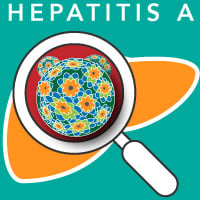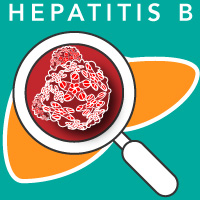We know viruses and diseases can be confusing. Here are some facts, tips, and quizzes to keep you informed.
CONTENTS
- Hepatitis A, B, & C
- HIV Testing - What's it Like?
- HIV Prevention Options
- Sexually Transmitted Infection Basics
HEPATITIS A, B, & C
The three most common types of hepatitis in the United States are hepatitis A, B, and C. Each has different symptoms and each is caused by a different virus. But, all three affect the liver and can cause long-term damage to it.

People infected with hepatitis A may not have symptoms. If you know someone who has hepatitis A or get the symptoms of the illness listed below, come in for a test as soon as possible. Call 410-837-2050 to set up an appointment.
TRANSMISSION Hepatitis A is a highly contagious virus usually spread when a person unknowingly ingests the virus from objects, food, or drinks contaminated by small, undetected amounts of stool from an infected person.
Transmission can be through food, sexual activity, or other daily behaviors. It is important to note that certain sexual activities have led to infections - including the activity of analingus, known as rimming. Remember to use safe sex practices and perhaps enjoy a little couple's shower play before engaging in rimming.
SYMPTOMS Unlike hepatitis B and C, hepatitis A often causes symptoms in children older than 6 and adults that can appear quickly and can include:
- Fever
- Fatigue
- Loss of appetite
- Nausea
- Vomiting
- Abdominal pain
- Dark urine
- Clay-colored stools
- Joint pain
- Jaundice (yellowing of the skin and eyes)
Most children younger than age 6 do not have symptoms when they have hepatitis A. The illness can range from a mild illness lasting a few weeks to a severe illness lasting several months.
Testing is the best way to know if you are infected. Make an appointment for the test by calling 410-837-2050. Let the Call Center know you need a hepatitis A test.
PREVENTION/VACCINATION The best way to prevent hepatitis A is through vaccination with the hepatitis A vaccine. Generally this vaccine is given in 2 doses 6 months apart. The vaccine is recommended for:
- All children at age 1 year
- Travelers to countries where hepatitis A is common
- Family and caregivers of adoptees from countries where hepatitis A is common
- Men who have sex with other men
- Users of recreational drugs, whether injected or not
- People with chronic or long-term liver disease, including hepatitis B or hepatitis C
- People with clotting-factor disorders
- People with direct contact with others who have hepatitis A
- Any person wishing to obtain immunity (protection)
Another means of protection is to practice good hand hygiene – including thoroughly washing hands after using the bathroom, changing diapers, and before preparing or eating food. This will help to reduce the spread of the virus.

Hepatitis B is spread like both hepatitis C and HIV - through bodily fluids like semen and blood.
Unlike hepatitis A, it is not spread casually - is not spread by coughing, sneezing, hugging, cooking and sharing food.
PREVENTION/VACCINATION There is a vaccine to prevent hepatitis B. The vaccine is usually given in three doses.
All children should get the hepatitis B vaccine.
- Babies should get a first dose of the hepatitis B vaccine at birth. They should have all three shots in the series by age 6 to 18 months.
- Infants born to mothers who have acute hepatitis B or have had the infection in the past should get a special hepatitis B vaccine within 12 hours of birth.
- Children younger than age 19 who have not had the vaccine should get "catch-up" doses.
Adults at high risk for hepatitis B should also be vaccinated, including:
- Health care workers
- Those who live with someone who has hepatitis B
- People with end-stage kidney disease, chronic liver disease, or HIV infection
- People with multiple sex partners and men who have sex with men
- People who use recreational, injectable drugs
TREATMENT There are treatments for hepatitis B but no cures. Those infected may develop a chronic infection, though that depends on the age of infection and timing of treatment.
If you believe you've been exposed to hepatitis B or any of the below put you at a greater risk for getting hepatitis b and have not been vaccinated, come in for a test and vaccination.
Hepatitis C is common - many people have it and do not know they do.
PREVENTION There is no vaccine to help prevent hep C. Certain people may have a higher risk of having hepatitis C. Check out the hep C checklist to find out if you're at a higher risk:
- Current injection drug users
- Past injection drug users, including those who injected only one time or many years ago
- Recipients of donated blood, blood products, and organs
- People who received a blood product for clotting problems made before 1987
- Hemodialysis patients or persons who spent many years on dialysis for kidney failure
- People who received body piercing or tattoos done with non-sterile instruments
- People with known exposures to the hepatitis C virus, such as
- Health care workers injured by needlesticks
- Recipients of blood or organs from a donor who tested positive for the hepatitis C virus
- HIV-infected persons
- Children born to mothers infected with the hepatitis C virus
TESTING Testing is easy and quick. Chase Brexton providers and our health care teams can test you for hepatitis C using a rapid test. You will get results in about 20 minutes. The rapid test will show if you have developed any hepatitis C 'antibodies'. Antibodies are substances the body produces in response to a virus, and show that at some point in your life, you were exposed to the virus. If the rapid test comes back postitive for hepatitis C antibodies, a Chase Brexton provider will have you get a confirmation test to see if the virus is still present in your bloodstream.
TREATMENT Chase Brexton's Infectious Disease Center of Excellence has developed a comprehensive and effective treatment program which has successfully cured more than 90 percent of hepatitis C patients.
- Your treatment will include a team approach: your provider, a pharmacist, and a care coordinator will work closely with you.
- You will never feel alone in your care: your team will assist you with any questions, concerns, financial issues throughout.
- You will have us to lean on: the medication treatment will take about 2 to 3 months. And your team will continue to follow up with you after treatment to make sure you are doing well.
By following Chase Brexton's hepatitis C treatment program, you have a high chance of being cured. Not all patients will be cured. If that is the case, your care team will find the best solutions and treatment options to help you lead a healthier life. Call 410-837-2050 to make an appointment today.
HIV TESTING - WHAT'S IT LIKE?
It's normal to be nervous. But getting tested is one of the best things you can do for your health.
The test is quick, confidential, and free at Chase Brexton Health Care. And, we’re here to help you the whole way. Here's how it goes:
Our POWER Team testers will talk with you about:
- your sexual health,
- why you’re getting tested, and
- any risks that may increase your chances of infection.
DO be honest with your tester! We aren't going to judge you. And, you probably aren’t saying anything we haven’t talked about/experienced before.
DON'T be ashamed! We are a sex-positive group. You are safe with us!
DO ask questions! Ask all you want. Talk freely about your experiences, fears, and anything that is on your mind.
Chase Brexton generally uses a blood sample for testing. We take a small sample of blood from your finger. It's fast and not painful.
How it works:
- The tests are rapid tests - the results will be given to you within 20 minutes.
- Rapid tests look for HIV antibodies.
- The rapid test is very accurate, but laboratory testing is required to confirm the test if you receive a positive result.
If you receive a positive result, our next step is to get you into care. We know that dealing with HIV is scary at first. We'll partner with you to help you get the care you need to keep you healthy. Your care is very important so we begin with an intial lab test to confirm results and get you into an appointment with a care team of providers within 5 days.
Your care will include:
- Physical exams, diagnostic tests, and on-going care and treatment
- Support from a peer advisor and your care team
- Social work support to help with financial and insurance issues, as well as everyday life issues
- Treatment for coinfections such as Hepatitis B or C
- Nutritional assessments and consultations
- Education and medication support through ongoing classes and support teams
- On-site pharmacy with pharmacists specifically trained and experienced in HIV medications
HIV Prevention Options
Abstinence, regular testing, using condoms every time: these methods work. Now, there are more options available, too.
PEP must be used within 72 hours of exposure. Call our POWER Clinic team for assistance: 410-837-2050 X8813
What is PEP? PEP, Post-Exposure Prophylaxis, is used when you might have been exposed to HIV. To prevent HIV infection, you will take anti-HIV medications for a month.
How do I use PEP?
- Within 72 hours of exposure, come to Chase Brexton Health Care during walk-in hours or call 410-837-2050 X8813.
- You will be prescribed two to three anti-HIV drugs.
- You must take the prescribed medicines for 28 days.
What can I expect with PEP? PEP side effects make the medicines hard to take but the side effects are treatable and are not life threatening. PEP is not 100% effective. But, in urgent cases, it is a valuable way to reduce your risk of HIV infection.
How do I pay for PEP? If you are uninsured or your insurance doesn't cover PEP, we will work with you to find a way to cover the cost of the medicine.
What is PrEP?
Pre-Exposure Prophylaxis, or PrEP, is a medicine that reduces the risk of HIV infection for people who are not infected with HIV.
How does it work?
PrEP comes in pill and injection form. Chase Brexton currently offers both forms.
PrEP is made of a combination of medicines that are used to treat HIV. These medications prevent HIV from making copies of itself and turning into an infection that’s spread throughout your body. PrEP works by stopping any HIV that may enter your body from staying in your body and turning into an infection.
Who should consider taking PrEP?
PrEP is meant for people at risk of getting HIV because they may often be exposed to the virus—for example, someone who is HIV-negative but has a partner living with HIV and may not consistently use condoms or the partner with HIV may not consistently have undetectable HIV levels.
How do I get PrEP?
Talk with your Chase Brexton health care provider today, ask about it at your next HIV test, or come during our POWER Clinic to learn about your risks and to see if PrEP might work for you. Same day starts are available.
U=U means undetectable equals untransmittable. That means: HIV treatment works to stop the spread of HIV.
UNDETECTABLE = CURED?
Having an undetectable viral load does not mean HIV is cured. The virus is still in the body. If a person with HIV stops taking HIV treatment or misses too many doses, their viral loads will increase and they will likely become detectable. They also might need a new type of medication - HIV can become resistant to drugs.
WHY DOES UNDETECTABLE MATTER?
- Being undetectable is healthy – People with HIV who have undetectable viral loads are less likely to develop serious illnesses and have less damage done to their body.
- Having an undetectable viral load also means HIV can't be spread through sex. Win-win!
ARE YOU UNDETECTABLE?
The only way a person with HIV can know if they are undetectable is to see their provider regularly for viral load tests.
UNDETECTABLE, PREP, AND SEXUALLY TRANSMITTED INFECTIONS (STIS)
Knowing your or your partner's viral load is good. A person with HIV whose viral load is undetectable can’t pass on HIV - and a person without HIV whose partner's viral load is undetectable won't get HIV from their partner through sexual activity.
Pre-exposure prophylaxis (PrEP) is another way to protect against HIV for someone without HIV.
Remember, of course, an undetectable HIV viral load doesn’t prevent transmission of other sexually transmitted infections (STIs), like chlamydia or gonorrhea. Using condoms can reduce the risk of many STIs.

